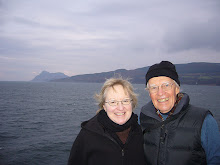
In September, just before leaving New York, Gayle was given a book by Fred Weidman of Auburn Seminary -- a book by a Scot, Alistair McIntosh, called Soil and Soul: People versus Corporate Power, which she brought with her to Scotland. It was only after I happened to meet McIntosh at a lecture on poverty that I became interested, and found the book to be one of the most intriguing I have read in a long time. Beautifully written, almost every page is worth quoting; there is a great depth of wisdom here. McIntosh is first and foremost an ecologist, and one who sees the presence of God in every blade of grass -- every stone -- and who manifest his reverence for Creation in his writing, by action "on the streets," and in the halls of academia and power. The sequence is autobiographical. We accompany McIntosh on his journey beginning on the isolated island of Lewis, where he was born and nurtured in the deeply spiritual culture of the Hebrides. He was gounded in the soil and enriched by the Centic music and poetry and by the earth itself; in short, by the spirituality that permeates the islands. He grew up playing around the 5,000-year-old Stones of Calanais, which he grew to respect as evidence that the sanctity of this place has been recognized for millennia. In his journey, McIntosh eventually becomes the teaching director of the Centre for Human Ecology of the University of Edinburgh, which he was later forced to leave on the grounds that he was too activist for such a hoary academic institution. The work of the Centre was praised around the world for its great achievements. A major section of the book describes McIntosh's campaign to undo the damage done by the Highlands Clearances that banished common people from the land that their forebears had lived on for centuries, to make way for hunting grounds and the grand estates of the "lairds." Over years of struggle, working with a few others, he was able to organize the handful of tenants on the Isle of Eigg and expel the playboy owner, restoring the island to the crofters who could enjoy the land as it once was -- common land, held in Trust to be shared by everyone who lived on it. At the same time he was able to prevent the building of a superquarry that would have destroyed a majestic Hebridean mountain, much as the coal mines of West Virginia are raping that beautiful landscape. The testimory of a powerful Mi'Kmaq Native American, Warrior Chief Sulian Stone Eagle, helped in that cause. I encourage you to own Soil and Soul ($10.26 used from Amazon) and to rejoice in the holistic ways in which Alistair McIntosh celebrates life on earth. In the context of his own life story and in his encyclopaedic knowledge, he is asking "the central spiritual issue of our time: How can we invite the spirit back into our world?" And then he quotes from a country bard from the Isle of Lewis, " 'Where can we find the Holy Spirit, that "Arrow of the Lord" with which to pierce the skin of surly selfishness.?' " One final comment: If you long to go to Seminary but, for whatever reason, are unable to, reading and disgesting this book in a community of prayer and justice would be a credible substitute. |
_-
_________________________________________________________________
"Towards the end of the book of Ezekiel, the prophet is shown a vision of the land that had once been broken and turned to wilderness. But the bones of the dead have come back to life. The Earth, a new Eden, is restored by a stream that rises from the ground beneath the sacred place.
" 'Wherever the river goes,' Ezekiel is told, 'every living creature that swarms will live, and there will be very many fish.' All kinds of trees will grow. Because 'the water flows from the sanctuary, their fruit will be for food, and their leaves for healing.' Restored natural ecology is to be complemented with restored social justice. Even those of the lowest status, 'the aliens who reside among you and have begotten children' -- that is to say, incomers [immigrants] and refugees who have chosen to stay and who seriously wish to belong to a place -- these 'shall be to you as citizens of Israel; with you they shall be alloted an inheritance of the land...' (Ezekiel 47:12, 21-3)
"This image of a restored human and natural ecology -- a return to Eden -- recurs at various points in the Bible... We find it right at the end, in the last chapter of the enigmatic Book of Revelation... It leaves us with a vision in which loss, destruction and death have been passed through. A new world opens out, beyond all the crucifixions and the suffering. It is as if we pass back through the fire from which we were born, now stripped of ego, of craving and of officious striving for control... Our struggle, the challenge of becoming fully human and the full meaning of our troubled times, is to make it 'back to the garden' -- to return to Eden." (Alistair McIntosh, Soil and Soul, Pg 246f.)

No comments:
Post a Comment